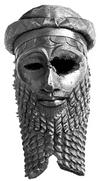- Akkad
-
/ak"ad, ah"kahd/, n. Also, Accad.1. one of the ancient kingdoms of Mesopotamia, the northern division of Babylonia.2. Also called Agade. a city in and the capital of this kingdom, one of the three cities of Nimrod's kingdom. Gen. 10:10.adj.3. Akkadian.
* * *
Ancient region, central Iraq.Akkad was the northern division of ancient Babylonia (Sumer was the southern division). Its name was taken from the city of Agade, founded by the conqueror Sargon с 2300 BC. Sargon united the city-states in the region and extended the empire to much of Mesopotamia, including Sumer, Elam, and the upper Tigris. The empire waned in the 22nd century BC. Under the kings of Akkad, their Semitic language, Akkadian, became a literary language, and great art was fostered. Bronze head of a king, perhaps Sargon of Akkad, from Nineveh (now in Iraq), Akkadian period, ...Courtesy of the Directorate General of Antiquities, Baghdad, Iraq
Bronze head of a king, perhaps Sargon of Akkad, from Nineveh (now in Iraq), Akkadian period, ...Courtesy of the Directorate General of Antiquities, Baghdad, Iraq* * *
▪ historical region, Mesopotamiaancient region in what is now central Iraq. Akkad was the northern (or northwestern) division of ancient Babylonian civilization. The region was located roughly in the area where the Tigris and Euphrates rivers (see Tigris-Euphrates river system) are closest to each other, and its northern limit extended beyond the line of the modern cities of Al-Fallūjah and Baghdad. The early inhabitants of this region were predominantly Semitic, and their speech is called Akkadian. To the south of the region of Akkad lay Sumer, the southern (or southeastern) division of ancient Babylonia, which was inhabited by a non-Semitic people known as Sumerians.The name of Akkad was taken from the city of Agade, which was founded by the Semitic conqueror Sargon in about 2300 BCE. Sargon united the various city-states in the region and extended his rule to encompass much of Mesopotamia (Mesopotamia, history of). After the fall of Sargon's dynasty in about 2150 BCE, the central Iraq region was ruled by a state jointly composed of Sumerians and Akkadians. (Akkadian language)Under the kings of Akkad, their Semitic language, known as Akkadian (Akkadian language), became a literary language that was written with the cuneiform system of writing. Akkadian is the oldest Semitic dialect still preserved.* * *
Universalium. 2010.
